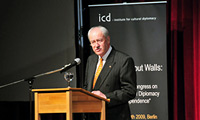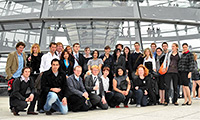The Berlin International Economics Congress
An Interdisciplinary Analysis of the Roles of Global Politics & Civil Society in International Economics

The global financial crisis of the last three years combined with increasing economic integration and interdependence between nation states has highlighted the extensive influence of the international economy on a diverse range of sectors. Foreign policy, research and innovation, trade and investment, environmental policy, social welfare, tourism, business development and practices, and access to education are all areas that are intrinsically linked to the state of the International Economics.
In seeking to explore the challenges and opportunities presented by international economic relations we must therefore take an approach that encompasses perspectives not only from the field of economics, but also from international politics, civil society and the private sector, as well as academic research and theories from political science, social science, and development studies.
The BIEC is a four day program of lectures and panel discussions featuring leading figures from across the world in economics, politics, civil society and the private sector. Speakers and participants will discuss different perspectives on the recent financial crisis and the international economy.
Congress Agenda
In particular, the Berlin International Economics Congress will pursue the following specific aims:
- To increase the range of stakeholders taking part in the global debate on the international economy by identifying and defining additional partners from the public sector, the private sector, civil society, and academia
- To explore the relationship between economic interdependence (economic bridges) and global peace and stability
- To assess the benefits and challenges of corporate social responsibility (CSR) and socially responsible investment (SRI) in international relations
- To explore the role of Cultural Diplomacy and Soft Power policies in strengthening multilateral cooperation in the global economy
- To produce clear policy recommendations to decision makers based on inter-disciplinary approaches and perspectives
The following issues will be addressed and explored:
- The New Economic World Order & International Relations
(Focus: Russia, China, India, Brazil, South Africa, and Indonesia) - Moving Beyond Copenhagen: Bridging International Economics and Climate Change
(Focus: The Copenhagen Conference, Economic Dimensions of Climate Change, the Role of Civil Society, Green Technologies) - The Global Financial Crisis
(Focus: Causes, Impact, Protectionism and the Challenges Ahead; Case studies of Iceland, Dubai, Latvia, Hungary, and the US) - Corporate Social Responsibility and Socially Responsible Investment
(Focus: Multinational Corporations in Africa, Latin America and Asia, the Triple Bottom Line, Business Ethics, CSR Rating Indices) - Traditional Industries in the Information Age
(Focus: Real Estate, Tourism, Car and Aircraft Industries, and Agriculture) - Ethics in Aid and Trade: Incentives and Impacts
(Focus: Ethical Trading Initiatives, Fair-trade, Ethical Consumerism, The Role of NGOs)


































































